The travel industry has undergone remarkable transformation over the past few years. While online bookings are still popular, curated travel experiences are also gaining traction.
Travelers are increasingly seeking off-beat destinations with guided tours. They prefer a relaxed travel experience, focusing more on enjoyment rather than planning. Therefore, the role of travel agencies has become more critical than ever as they craft these personalized and hassle-free travel experiences for their customers.
With the right travel agency marketing strategy, travel agents and businesses can attract the ideal client to their business and grow rapidly.
This blog post is the complete guide for travel agencies to unlock opportunities, grow their business, and use the best marketing strategies to reach their clients.
Table of contents
How do you develop the best marketing strategy for travel agencies?
Travel agencies can follow a simple process to identify the right digital marketing strategy for their business. For best results, they require an intimate understanding of their market, audience, business USP, competitors, and the marketing channels they can explore.
Let’s dive in for more details:
1. Know your market
Getting the lay of the land will let you know how to compete in the market. Start by understanding who the leading players are (even if they are not direct competitors). Analyze the average travel budget and how much clients are willing to spend annually on travel businesses.
You must also gauge the potential risk factors, especially when entering a new market.
2. Understand your audience
Within the overall market, travel agencies must clearly define their target audience. Use identifiers such as age, gender, family size, earning potential, location, etc. You can also create elaborate buyer personas to guide your digital marketing efforts.
3. Define your USP
The travel agency business is highly competitive, making it difficult for smaller businesses to survive without a niche or differentiating characteristics. Identify what sets your business apart from others and further develop this USP (unique selling proposition).
Your business USP must be the focal point for digital marketing messages, branding development, and advertising efforts.
4. Understand your competitors
Now that you know your audience and USP, look for competitors providing services similar to your target audience. Understand what makes them work and what issues customers have with them, analyze their reviews and ratings, and monitor their marketing campaigns on social media.
A complete understanding of competitors will help you outshine them easily.
5. Identify potential marketing channels
The last and most crucial step is to choose the marketing channels you can explore to grow your travel agency business. This would depend on your marketing budget, competitor analysis, resource availability, and target audience.
Choose five to six marketing channels, analyze the results, and tweak your marketing campaigns accordingly.
How do you market your travel agency? 12 strategies and ideas to launch today
Travel agencies can market their business via popular channels like social media, email marketing, SMS marketing, paid ad marketing, travel listing websites, and influencer marketing.
Some of the top travel agency marketing strategies to follow are:
- Build a solid social media presence
- Optimize for organic search
- Level up your website
- Leverage review marketing with Birdeye Reviews
- Build a referral network
- Run specialized discount campaigns
- Invest in video marketing
- Experiment with influencer marketing
- Connect with customers via SMS
- Run paid campaigns
- Build partnerships with hotels and destinations
- Use a travel agency promotion software
Let us explore these marketing ideas for travel agencies in detail.
1. Build a solid social media presence
Travel agencies must note that their potential clients actively seek travel inspiration recommendations for destinations and agencies on social media. A recent survey shows that 87% of millennials use Facebook for travel booking inspirations, while 50% use Pinterest and Twitter to inspire them.
This makes it critical for travel agencies to build a strong presence on social media and influence potential clients to choose them.
Some tips for travel agencies to accelerate the impact of their social media presence are:
- Post niche-specific content regularly with photos, videos, and customer experiences.
- Use a social media scheduling tool like Birdeye Social to post often without having to log in every day.
- Share customer reviews and testimonials to boost social proof.
- Use trending hashtags content formats, and follow viral trends to gain momentum and acquire followers.
2. Optimize for organic search
According to Google, they saw an all-time high search volume for “fun activities” in 2021 across the U.S. Google has introduced attractions, ticket booking, blogs and links to experiences, and Google flights to help customers find easy ways to travel.
Showing up for these search queries is very important for the growth of your travel agency business. And, you can make it happen by investing in organic content marketing.
- Travel agencies must create blogs, guides, and exclusive experience curations to rank higher in organic search results.
- Target high-profile travel destinations, popular tourist attractions, and offbeat experiences that people seek when they look for fun experiences. Create authoritative, helpful, and unique content to guide clients to your travel agency.
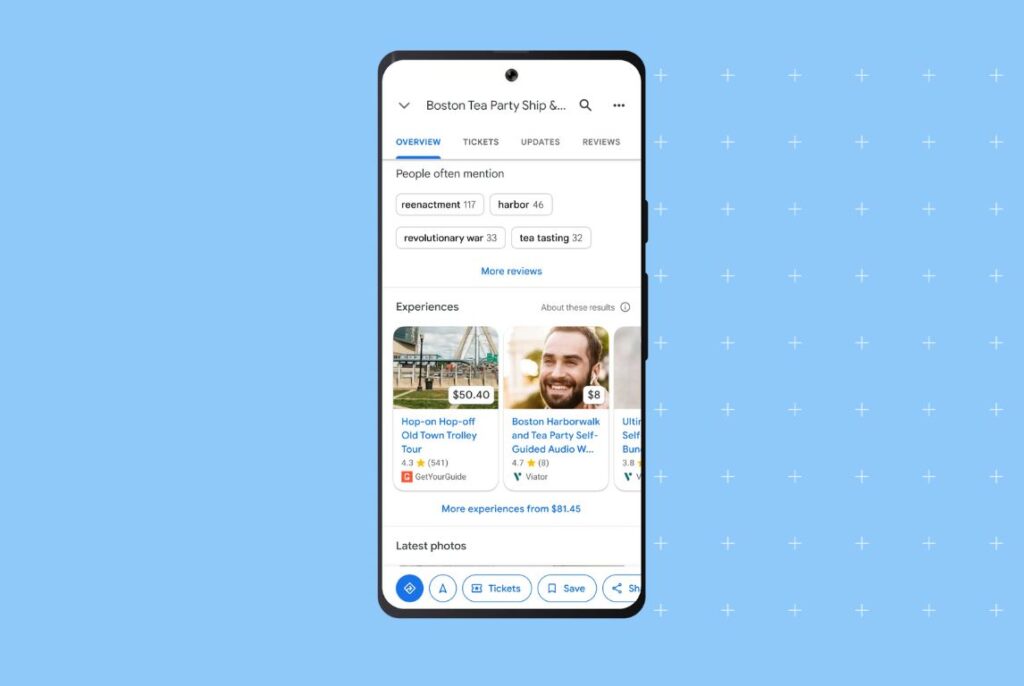
- Create, update, and monitor your Google Business Profile so local customers can easily find you. Requesting customers to leave reviews, responding to reviews, and regularly posting updates are a few things that can help you feature in the top search results.
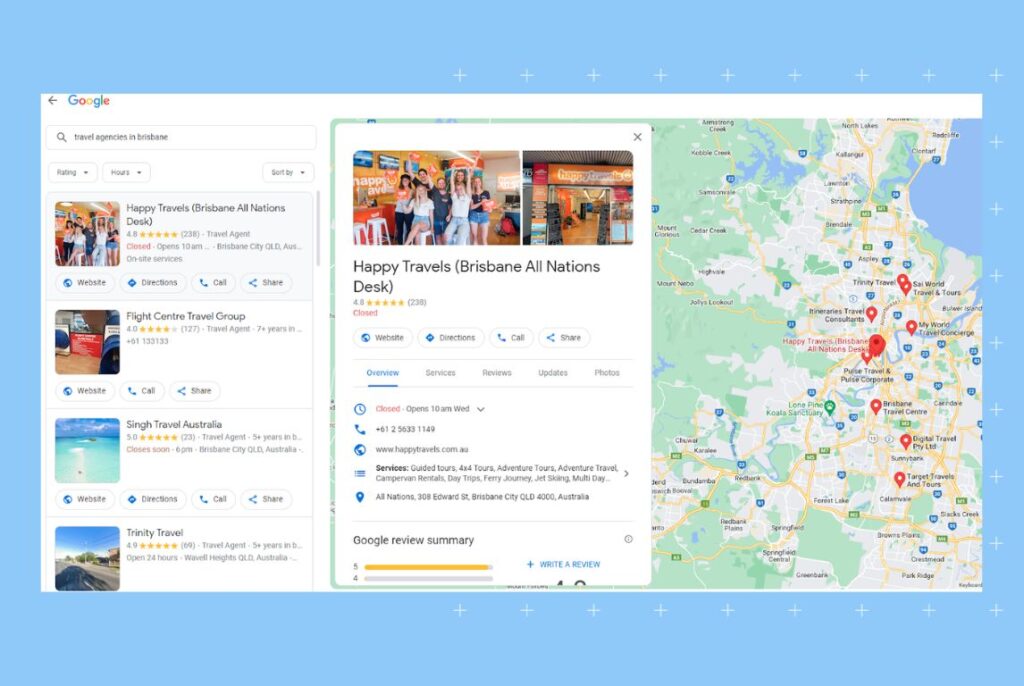
3. Level up your website
Most of your advertising campaigns, including Google Business Profile and sponsored ads, focus on driving traffic to your website. So, it becomes critical that your business website lives up to its promise and delivers an exceptional experience to the customer.
Simply having a basic website with just the packages or travel information is no longer sufficient. Your website needs to offer more to engage and attract potential customers.
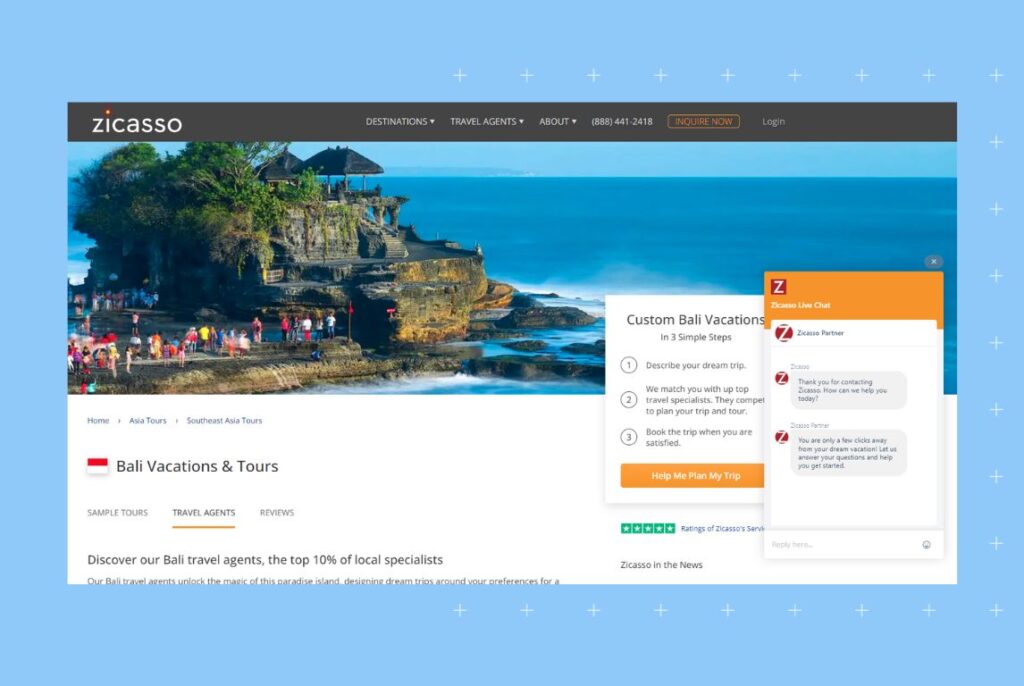
Level up your travel website by:
- Featuring Google reviews with a widget to showcase positive reviews and overall ratings.
- Showcasing video testimonials by customers.
- Sharing informational content on trip planning, budgeting, and popular destinations.
- Creating individual pages for each location you serve.
- Creating dedicated landing pages for popular travel destinations and flights.
- Implementing a conversational AI chatbot like Birdeye Webchat to interact with visitors, collect information, and turn visitors into leads. Conversational AI chatbots can mimic human interaction and convince customers to engage with your business.
4. Leverage review marketing with Birdeye Reviews
Review marketing means leveraging the power of reviews across your marketing campaigns to boost social proof, build trust, and improve the conversion rate of your business.
Research shows that 83% of travelers read reviews before finalizing a booking. Online reviews play an essential role in the reputation of a business and are a significant factor in a client’s travel decision, too.
Social proof elements like reviews, testimonials, and user-generated content on social media can help you gain the trust of potential clients. But securing client reviews isn’t enough; you must actively promote them.
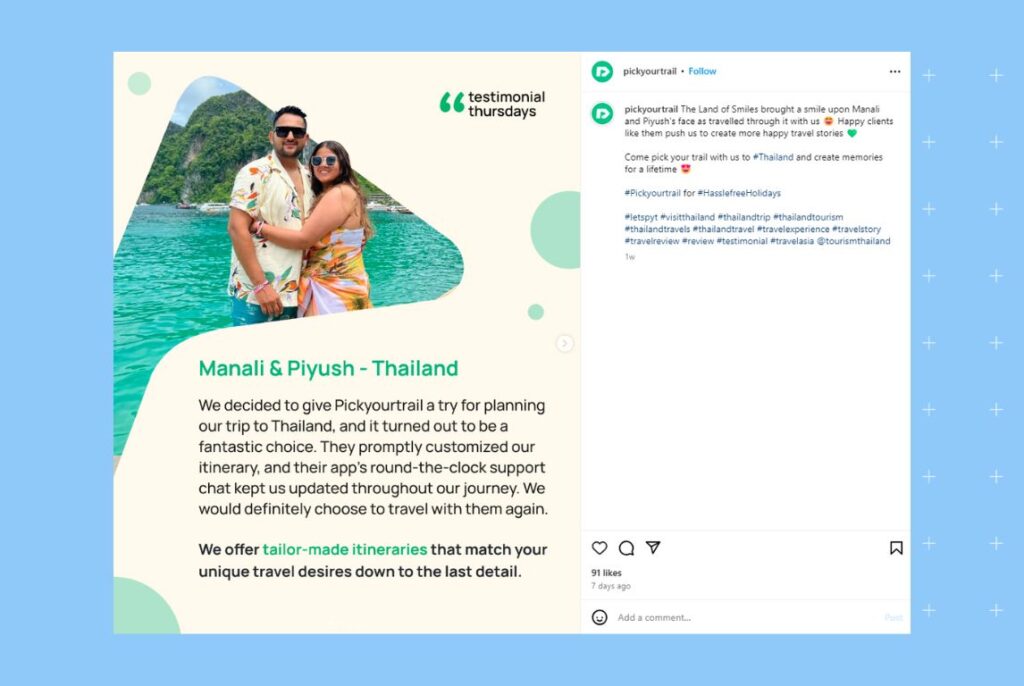
Some easy ways to leverage reviews for a travel agency are:
- Using the Google Seller Ratings program and including your Google Reviews star rating in your Google Ads.
- Sharing recent reviews on social media platforms such as LinkedIn, Instagram Stories, Facebook, and X (formerly Twitter).
- Running contests and giveaways to motivate clients to share their travel experiences on social media.
- Including reviews in your email marketing newsletters.
- Monitoring popular travel review sites to find and share positive reviews across platforms.
5. Build a referral network
Word-of-mouth recommendations from family and friends go a long way in convincing potential clients to choose your travel business. You can actively grow your business by investing in a referral program.
Don’t put the onus on clients to bring you leads via referrals. Instead, take proactive steps to build a referral network for your business with Birdeye Referrals.
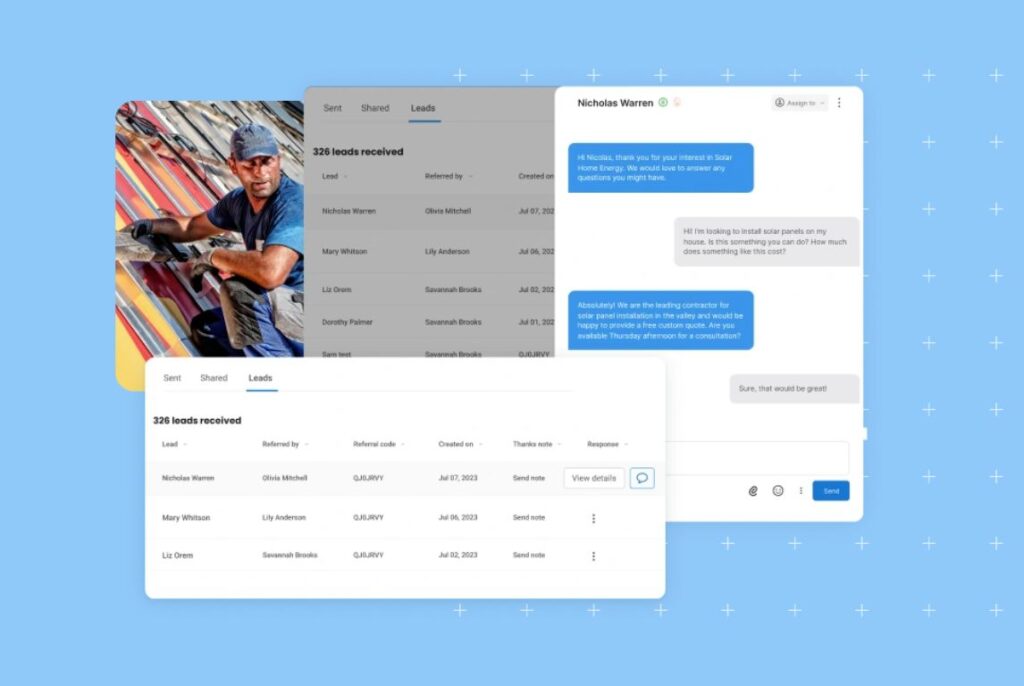
Travel businesses can:
- Build a customer-centric environment that elevates customer experience, improves customer satisfaction, and boosts loyalty.
- Send automated referral emails to clients who leave positive feedback via surveys and reviews.
- Share custom referral codes with clients to encourage them to recommend your business.
Recommended read: 11 steps to craft a referral program
Grow your travel business and outshine competitors
Want to see the impact of Birdeye on your business? Watch the Free Demo Now.
6. Run specialized discount campaigns
Most travel businesses are seasonal and face trouble attracting clients in the off-season. That is the ideal time to deploy specialized discount campaigns to attract potential clients looking to travel.
You can promote off-beat destinations, offer discount codes for peak-season travel with a pre-booking facility, and reward clients with special promotions.
These campaigns are only effective when you know your target audience well and have an established online reputation. That way, clients can trust you and book your packages even if the travel dates are far off.
Recommend read: Online reputation management guide
7. Invest in video marketing
Videos dominate all major marketing channels, from Google search results to social media. Marketers have also found that you can increase the open rate of an email just by including the word video in the subject line.
These facts show us that intense, engaging, and informational videos are significant assets to travel businesses, especially when people choose destinations based on how “photo-worthy” they are.
Investing in video production, creation, and publishing can be expensive, but you can leverage many tools such as Canva, Adobe Suite, or Vimeo.
Some video marketing ideas that travel businesses can leverage are:
- Video itinerary of popular tour packages.
- How-to videos on packing, flight arrangements, visa application, etc.
- Travel tips from previous clients.
- Instagram Reels and YouTube Shorts for launching new discounts or tour packages.
8. Experiment with influencer marketing
Instagram and Facebook are influential solid channels in the travel industry. In fact, 84% of social media users said that they rely on travel influencers for recommendations. They trust their opinions and make purchase decisions accordingly.
Investing in influencer marketing can be one of the most profitable decisions for your travel business. Millennials and Gen Z follow at least one travel influencer, and millions of accounts post about travel across channels.
Find the right influencer for your travel business by evaluating their target audience, engagement rates, travel niche, and budgets.
Choose the right person and engage them with free trips, exclusive discount codes for their audience, sponsored posts, and more.
9. Connect with customers via SMS
Social media channels are great for engagement but have a significant drawback – they own the customer data. One day of downtime, and you can lose millions in engagement. Businesses should build a lead database with paid campaigns and lead magnets like exclusive offers.
Once you have that information, you can directly engage your potential clients with SMS marketing.
SMS has one of the highest open and response rates across channels. Clients prefer getting discount deals, important alerts, and engaging messages from businesses they like. SMS offers convenience to clients and allows them to talk to your business when they are on the go.
You can leverage this channel to send flash discounts, engage customers once they visit your website, stay connected with the client, and improve your conversion rate.
10. Run paid campaigns
In highly competitive industries like travel, organic marketing alone is not enough to stand out. To build brand awareness and ensure that every potential customer knows your brand, travel businesses must invest in paid campaigns.
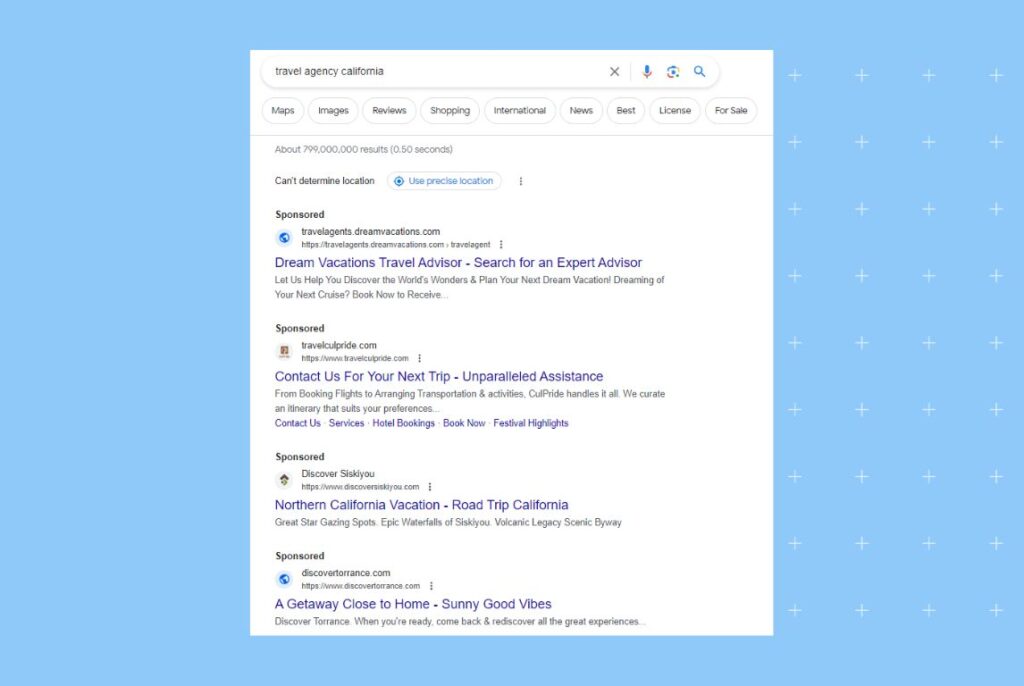
Some famous advertising channels for travel businesses include Google, Facebook, Instagram, LinkedIn, and online travel agents (OTA) such as Expedia.
Choose an advertising channel that allows you to start with a smaller budget but reaches your target audience for the best results. Run a survey to see what sites your audience uses the most and plan accordingly.
Most travel businesses see good results in advertising on Google, Facebook/Instagram, and OTA sites.
11. Build partnerships with hotels and destinations
Networks and partnerships can come in handy when you are a growing business with a small footprint in the market. You can benefit from the hotel and destination’s popularity and secure clients from their referrals.
Clients often trust the recommendations from their hotels and are more likely to work with you coming from a trusted source.
To build partnerships with famous hotels and destinations, travel agencies can:
- Appoint an exclusive liaison for their clients and provide exceptional customer experience.
- Provide services at an affordable price to improve the likelihood of securing the client.
- Offer exclusive tour packages and improve customer delight.
Your online presence will also benefit from these partnerships as you can host the logos of prominent players on your website, social media, and other marketing channels.
12. Use a travel agency promotion software
Running a travel business is challenging. It demands your full attention and resources for client satisfaction. Fortunately, a variety of travel agent marketing tools are available to help you achieve that.
Specifically, travel agency promotion software can help enhance customer experience, boost online reputation, and effectively promote your travel agency.
Birdeye is the top-rated customer experience platform that offers review management, listing management, referrals, surveys, social media management, payments, and so much more to businesses.
With Birdeye, you can take control of your business’s online presence on Google, social media, and many other platforms.
Check out the tool’s pricing today for more details!
FAQs on travel agency marketing
The key to growing your travel business is to invest in online marketing strategies across Google, listing websites, business website promotion, and building partnerships with hotels, influencers, and premium destinations.
You can advertise your travel agency on Google, Facebook, Instagram, travel websites, and other free advertising sites like Foursquare.
Travel agencies can promote customer trust and loyalty by actively managing customer reviews, taking steps to boost online reputation, requesting customers for feedback, and running a loyalty program for repeat customers.
You can market your travel agency business online with Google Business Profile, Google Ads, social media marketing, listing on online travel agent websites, influencer marketing, and promoting customer reviews online.
Birdeye – the top-rated customer experience platform to grow your travel agency business
In the highly competitive travel industry, travel agencies must consistently put effort to survive and thrive. It’s crucial for travel businesses to invest in extensive online marketing strategies, networking, and partnerships to gain a competitive edge in the market.
Additionally, travel businesses must ensure they provide the best customer experience, build a solid online reputation, and take proactive steps to act on customer feedback. To do this effectively, they need an automation tool that can take over and help them focus more on operations and individual clients.
Birdeye provides comprehensive tools that aid your travel business’s processes, from lead generation to customer satisfaction. It is a must-have in your arsenal.

Originally published


![[Feature image] Competitive intelligence tools- The definitive guide for 2025](https://birdeye.com/blog/wp-content/uploads/Feature-image-Competitive-intelligence-tools-The-definitive-guide-for-2025-375x195.jpg)






